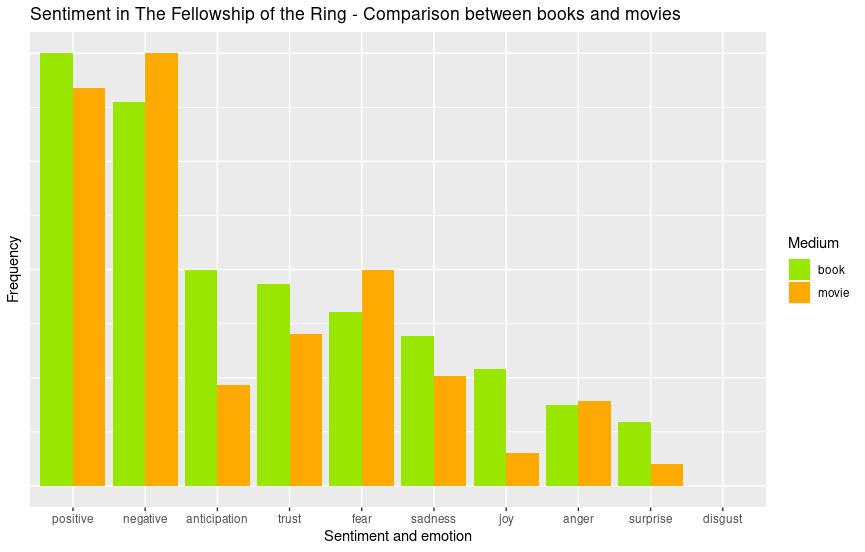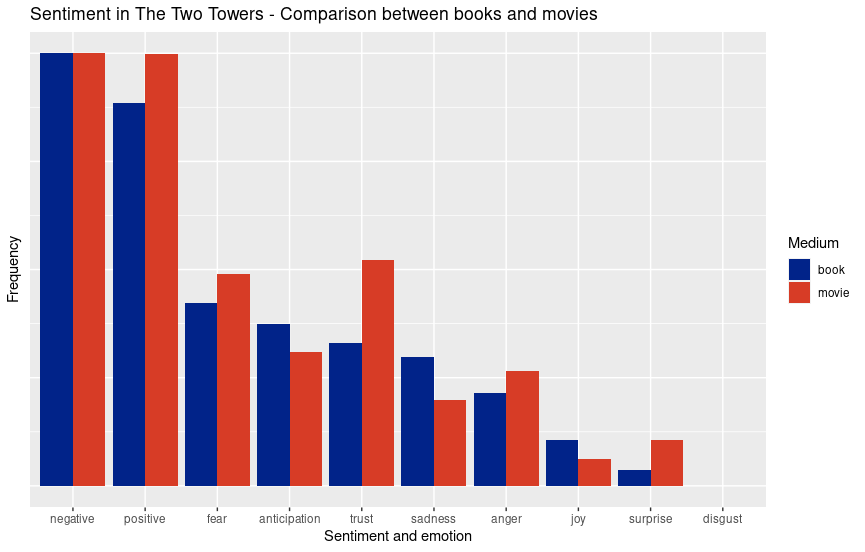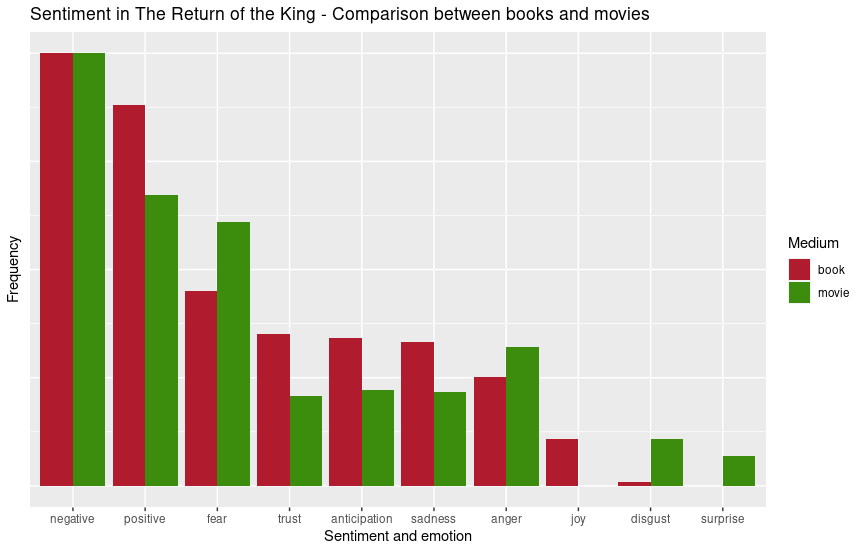Are the Lord of the Rings Movies Actually Good Adaptations of the Books?
A sentiment analysis of both the novels and movies from Middle-Earth
Project Overview
The Lord of the Rings trilogy movies, based of the novels by J.R.R. Tolkien, are among the best received franchises in the world and won 11 Oscars in total. It’s also regarded as a great adaptation of the books by most. The novels themselves also rank very high and where, at a time, the second bestselling book after only the bible. But of course, there are differences between the two. Some characters or scenes are left out, and lines from the books are given to other characters in the movie for example. I think we can all agree that a word for word adaptation isn't possible in the first place. Peter Jackson, the director and co-writer, has stated that:
The themes of Tolkien are another way of honouring the book. Because there’s so much detail that you ultimately can’t recreate. You can’t recreate the world of The Lord of the Rings with everything in the books. But, the thematic material is obviously critically important to translate from book to film. Because the themes are ultimately at the heart of any book.
I want to find out how well the writers of the movies adapted the themes from the novels into the scripts. I also must admit a great deal of bias from my side. I’m enamoured with both the books and the movies. Every year, I have at least one movie marathon and can quote them in my sleep. Since I adore them both, this research will either confirm my love for them or completely crush my soul.
The Data
I want to do analyses of the texts of both the novels and the scripts (extended editions of course!). I have a .txt file for each. Every word will be compared to a lexicon. This is a list of words and the connotation associated with it. All words in the books and scripts will be given a score, and the sum will tell us about the tone of the text. Some lexicons will simply indicate how negative or positive a document is, but I will be using a more nuanced one. The NRC lexicon will not only tell how negative or positive a text is, but also which emotions are associated (anger, fear, anticipation, trust, surprise, sadness, joy, and disgust). By performing a sentiment analysis on both the books and the movie scripts, I can compare them on an emotional level. I used the entire scripts, and not just the dialogue, because they also contain descriptions of scenes and the sentiment the film makers want to convey.
The analyses are performed with the R programming language. It’s great in performing statistics and has powerful packages to do text analysis with. I used the tidyverse package to implement transformations and the sentiment analyses. First, I collected the contents of both the books and the scripts and cleaned them. I removed punctuation, repeating whitespaces and numbers for example. Unfortunately, I also had to remove the word "Merry". This the name of one of the Hobbits but also a word with an emotional load and the analysis wouldn't know the difference. Before extracting sentiments, I wanted to make a quick overview of both trilogies. I made word clouds of the 100 most frequent words to have a glance at the type of texts we're dealing with.
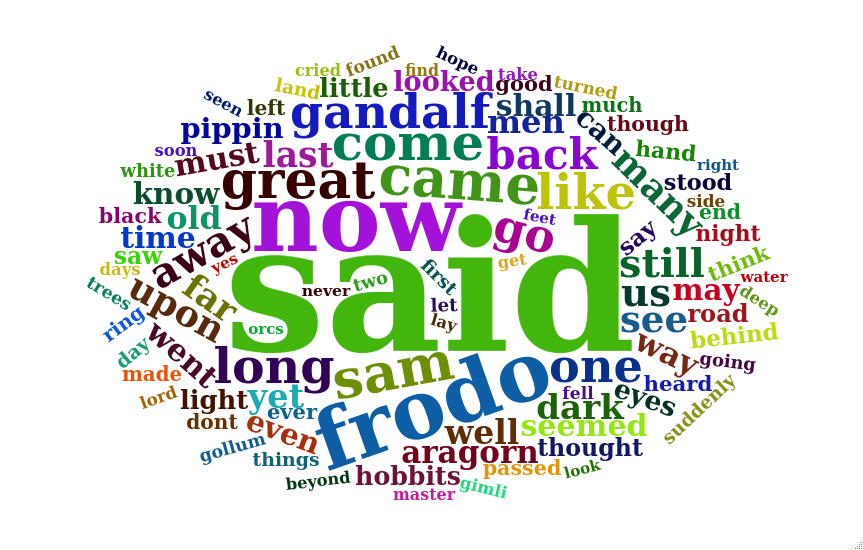
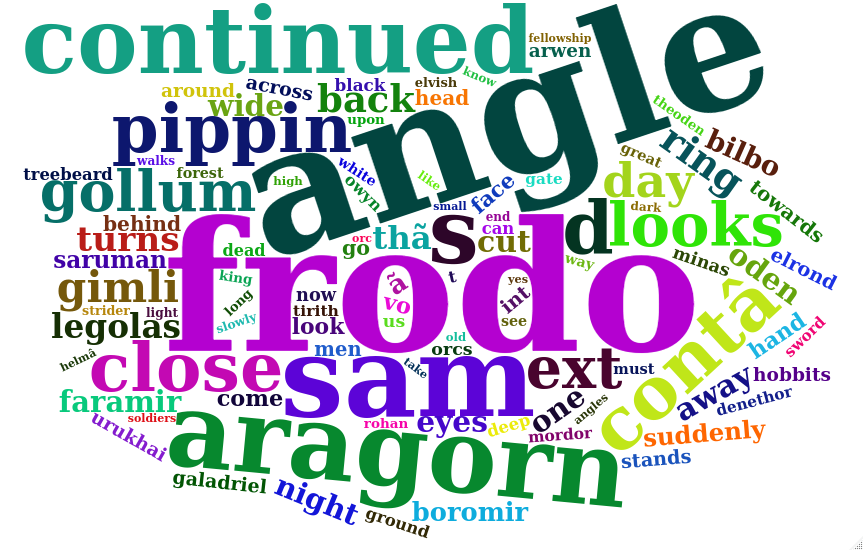
The movie scripts are definitely more technical in nature, which is to be expected. They contain terms used in film making while the books are more nuanced when describing a scene. The 100 most frequent words in the novels are also more evenly spread without that many outliers in wordcount. These differences aren't a huge surprise, since these are two different mediums. This makes it all the more interesting to compare the sentiments within the language used.
Sentiment analysis and comparison
After cleaning up the texts, it was time to extract the sentiments and compare them. I wrote three scripts. Two to gather sentiments from each trilogy and the third to make comparisons and build a nice plot. I normalized the data to put them in the same scale, before plotting the results. Below are the bar charts for each volume from the trilogies. The bars are sorted in decreasing order on the sentiments of the books. (click to expand)
As we can see, the scores are quite similar for most sentiment/emotions. There are some differences, but nothing major. Tolkien was an Oxford professor in linguistics and is undoubtedly hard to compete with after all. As far as positivity and negativity goes, the two mediums are almost the same. It can also be concluded that trust, fear, anticipation and sadness are in the top 4 of most prevalent emotions across the mediums. But what is the best adapted book of the bunch? Both The Fellowship of the Ring and Return of the King have similarity between 7 out of 10 sentiments. The second volume, The Two Towers, scores 8 out of 10 and is therefore the best adaptation in terms of thematics. Even though it has one of the more controversial scenes among book purists (elves at Helmsdeep?!).
At this point, it's safe to say that the movies did a good job on adapting the books! Both texts have a similar emotional load. But no one just watches just one movie and usually binges them all. Tolkien always intended to publish everything as one book anyway. So below is a chart with the comparison for the entire trilogy.
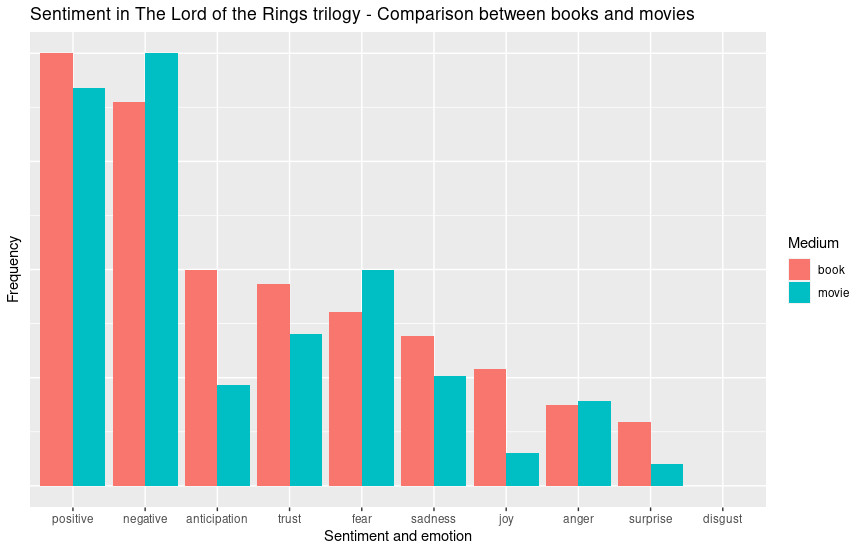
Again, this is a wonderful result! In 7 out of 10 categories, the books and movies share similar sentiments. Now it's even more clear that the appreciation I have for the movies is justified. It's not just a gut feeling anymore but also backed up with evidence. This explains why, even after two decades, why these movies are timeless and regarded as one of the best attempts to adapt equally popular books.
It's time that I reread the books and plan a movie marathon once more.

